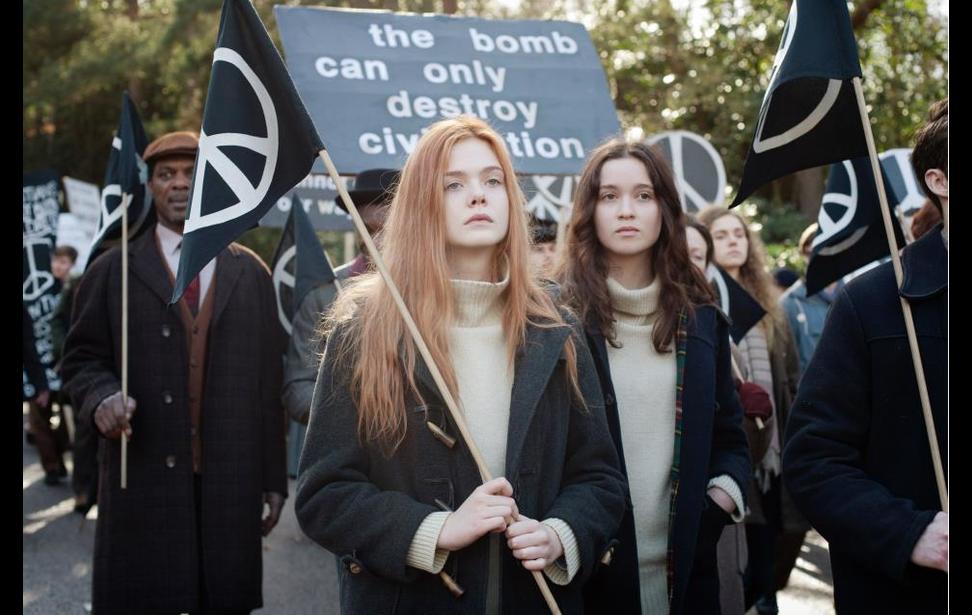Ginger and Rosa: Coming of Nuclear Age with Sally Potter
War is merely the continuation of politics by other means, Prussian general Carl von Clausewitz famously observed, to which Sally Potter’s new film Ginger and Rosa adds: politics is merely a continuation of personal relationships by other means.
Set in Potter’s native England, this intimate coming of ager tracks the friendship between Ginger (Elle Fanning) and Rosa (Alice Englert) (as seen in photos 1 -2 ), two teens born in the shadow of Hiroshima, in the late 50s. The Brits have spent nearly two decades in the sobering wake of WWII, but now it’s 1962, and anti-war ferment is the next wave. With a wink to the Nouvelle Vague, our searching ingenues grapple with ideology, desire and what to wear to the sexual revolution.
At the core of this story is fledgling activist Ginger, whose dread of armaggedon is further stoked by the Cuban Missile Crisis and by her libertarian father, Roland (Alessandro Nivola). As Ginger's closest relationships come under assault, her political anxieties approach meltdown. Roland, who also struggles to come of age, cloaks his fear of intimacy in bohemian cool. The personal is political, Potter reminds us, even though the era during which the film is set was not yet plastered with this shibboleth.
Greek tragedy has nothing up on Roland's ultimate betrayal--or on its fallout involving the friendship of our titular heroines and the despair of his long-suffering wife. Whether this nuclear family will survive the nucelar era is unclear (as seen in photo 3).
Happily, Sally Potter (as seen in photo 4) sat down with thalo and clarified a couple of other conundrums:
thalo: President Kennedy rhetoricizes about surrender mere frames after Roland uses the same word in the context of love. How were you connecting the personal and the global?
Sarah Potter: We are in the world and the world is in us. A lot of stuff gets done in the name of surrendering to the power of love, as if somehow one is helpless in the face of it: surrendering to a greater power, to religion, to the father -- there are so many layers that go with the notion of surrender. The whole trajectory of the film is about standing up for independent thought, which Roland encourages Ginger to do but doesn’t necessarily do himself, in a strange way. He opposes surrender to authority, but surrender to a deeper sense of truth, that’s something else.
th: The look of the film is by turns impressionistic and realistic. How did you guide cinematographer Robbie Ryan?
SP: I wanted this film to be simpler and more naked, more transparent (than earlier efforts such as Orlando and Yes). It was shot naturalistically and directly, mostly hand-held. We’d worked out the visual language and I’d done a lot of drawings, but I wanted him to be free to go with his eye and instinct. Ginger was the axis of the story and the visual axis of every scene. We needed to see every event through her eyes. We were either looking at her or seeing or feeling what she was seeing or feeling. So that gave us a guiding principle.
Photo credits:
Photo 1: (left to right) Alice Englert stars as Rosa and Elle Fanning stars as Ginger in Sally Potter’s early 60s tale “Ginger and Rosa.” Photo courtesy of A24.
Photo 2: (left to right ) Elle Fanning’s Ginger and Alice Englert’s Rosa protest nuclear arms in “Ginger and Rosa.” Photo courtesy of A24.
Photo 3: (left to right) Elle Fanning’s Ginger and Alessandro Nivola’s Roland await fateful news in “Ginger and Rosa.” Photo courtesy of A24.
Photo 4 Filmmaker Sally Potter. Photo courtesy of Brad Balfour.











